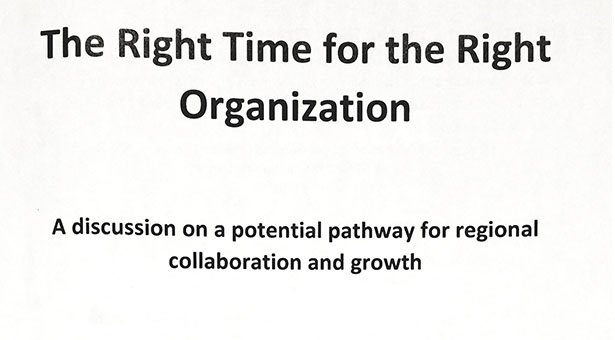By Scott Robertson
A document published online as part of the agenda for the Sept. 24 Bristol, Tenn., city council work session includes details of an effort to create a single entity “to serve as the primary economic development organization (EDO) for the eight counties recognized by the Tennessee Department of Economic and Community Development as its Northeast Tennessee Region.”
The document, a draft of a white paper authored by NETWORKS Sullivan Partnership CEO Clay Walker in collaboration with Northeast Tennessee Regional Economic Partnership (NeTREP) CEO Mitch Miller, includes 25 pages of details, plus a resolution ready for consideration by local governments. The plan, entitled, “The Right Time for the Right Organization” contemplates possibilities including the unification of NETWORKS and NeTREP.
Existence of the plan was first confirmed by NETWORKS Sullivan Partnership Chairman Bill Sumner in the September issue of The Business Journal. The Bristol City Council work session packet marked its first public release. Walker was on the agenda for the Sept. 24 work session to discuss regionalism and economic development. However, both he and Miller (who learned of the document’s publication when called by The Business Journal) appeared surprised Bristol had made the document public.
While the draft is dated June 26, 2019, its origins go back to the NETWORKS strategic planning retreat in June 2018, Walker told The Business Journal.
“We formed a committee to examine regionalism,” Walker said. “Whether we needed to step it up in this area – which I think everyone figured we did – how would a regional plan look, how would we be able to restructure and collaborate with NeTREP, if, in fact, a restructure would be necessary – just taking an assessment of how we were doing things and how could rethinking our procedures and interactions with other EDOs benefit us all.

“I worked on this paper for a few months, discussing it with my organization’s leadership along the way, before sharing it with Mitch towards the end of last year,” Walker said. “I wanted to get his input, especially if I had fundamentally misrepresented NeTREP in any way or suggested something that he was adamantly against.
“Mitch, as I expected he would, made some very helpful edits and, if memory serves, we implemented every one of his suggestions into the paper. We then went a little deeper with the potential for a merger or at least the sharing or division of duties among our organizations and even mocked up some working organizational charts.”
Both Walker and Miller said despite the inclusion of a model resolution for local governments, the plan is far from complete.
“I would call this a great start,” Miller said. “It basically got us to the point where our officers were able to come together. Clay and I have had conversations and a lot of other discussions have transpired as a result of putting that together.”
Walker called the plan a jumping off point for a broader discussion of regional economic development. “We’re not married to anything in here other than the main point that to be competitive, we have to find a way for better collaboration.”
A true regional economic development plan, Miller said, will eventually include items not addressed in the just-published draft. “I think it has helped us think beyond just what’s written in that report, to think bigger, to have more than traditional economic development, but to think about tourism, workforce development and other items.”
The Sept. 10 Northeast Tennessee/Southwest Virginia Regional Economic Forum did not play a role in the formation of the white paper, Walker said, noting that the draft had been in the works for months. However, he said, he hopes the organizers of that event, who have advocated for an “umbrella organization” to handle economic development in the region, will see this as an opportunity to move forward together.
“We’re open – in fact, we encourage – other stakeholders who are advocating for a true regional approach to economic development to dissect this plan, deconstruct it, beat it up, and help us get to the optimal course of action. Heck, we don’t even agree with everything in this document among ourselves.”
Walker said he’s looking forward to that process. “We believe that changing, adding, deleting and coming up with the final version of how we go forward as a region should be, must be a team project,” Walker said. “Not only would an attempt to dictate the terms without collaboration doom this or any plan to failure, but it would fly in the face of the ideals of regionalism itself.”
To read the draft in its entirety, click here.




